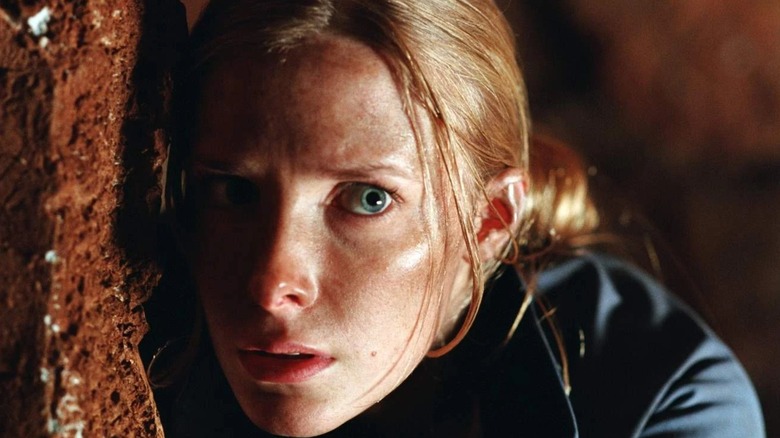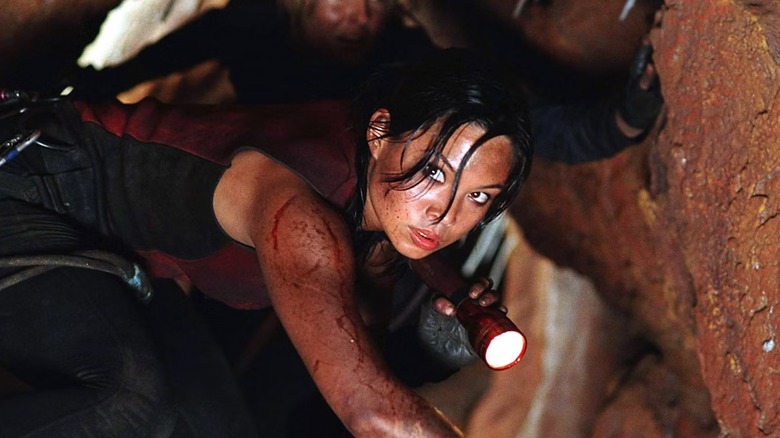Is The Descent A Feminist Horror Movie? Its Star Certainly Doesn't Think So
Neil Marshall's "The Descent" doesn't pander to mainstream genre tropes when it comes to its female characters. For starters, none of the characters portrayed by the film's all-female cast are victims of the Madonna-whore complex. Instead, they're flawed, complex beings who don't fit into problematic boxes, as their humanity (or lack thereof) is filtered through the horror of confronting something inexplicably evil. These six women aren't passive bystanders to the horror inside the caves either, as all of them take a survival-first approach, no matter how flawed it turns out to be. They bravely climb down ropes that lead deep inside ancient caverns, squeeze through dangerously narrow rock formations, and hack their way through hordes of monsters if need be.
While "The Descent" has undoubtedly redefined women-centric horror, can Marshall's film be considered feminist? Shauna Macdonald, who played our grieving protagonist, Sarah, doesn't think so. In an interview for SFX Magazine's November 2025 issue (which celebrates the film's groundbreaking 20-year legacy), Macdonald says that calling "The Descent" a feminist movie undermines the nuanced complexity of its central theme:
"A lot of people said, 'It's such a feminist movie,' and I said, 'Have you seen what we do to each other?' This was back in the early 2000s, when there was 'Girl Power' and the Spice Girls, and people were still talking like that, and saying, 'The Girl Power Movie.' It's really not; it's a film with complex female characters, and when they face a common foe, their friendships fracture and splinter, and it's every person for themselves. In 'Dog Soldiers', it was a group of squaddies facing a common foe, and they all come together and fight it together, whereas we betray each other."
So, what is "The Descent" all about?
The Descent is great feminist-leaning horror, but it stands for much more
Female solidarity isn't, and shouldn't, be treated like a monolith. In "The Descent," this sentiment is proven true after Sarah (Macdonald) learns that her friend, Juno (Natalie Mendoza), was having an affair with her husband before he died in a crash. This unexpected betrayal completely shatters Sarah, and the spelunking nightmare scenario adds to the escalating tension shared among the group. Fatal accidents and less-than-ideal decisions make an already precarious situation worse, but the existence of cave-dwelling crawlers adds a visceral edge to the horror.
When faced with such a terrifying threat, the women try to stick together, displaying impressive grit and physicality while combating these creatures. But once Sarah learns that Juno left Beth (Alex Reid) to die, past betrayals exacerbate the implications of this cruel act. Even while surrounded by beasts, Sarah turns on Juno, as her intense grief and rage clash with Juno's guilt-driven, always-put-yourself-first survival instincts. Macdonald weighs in on this turning point:
"The thing that pushes Sarah to do it is that Juno had left Beth to die alone. Having lost her daughter and husband, I think that was enough for her. But of course, it was the grief as well; she's not thinking rationally by that point. That was the ultimate punishment: not only had Juno had an affair with her [late] husband, but she'd also left their friend to die alone."
This fuels theories about whether the crawlers truly exist. Are they manifestations of Sarah's increasingly broken psyche? Well, it doesn't matter, as the group ultimately tears itself apart by succumbing to inner demons far more chilling than the beasts that surround them. To drive the tragedy home, a certain alternate ending makes sure that no one makes it out alive.

